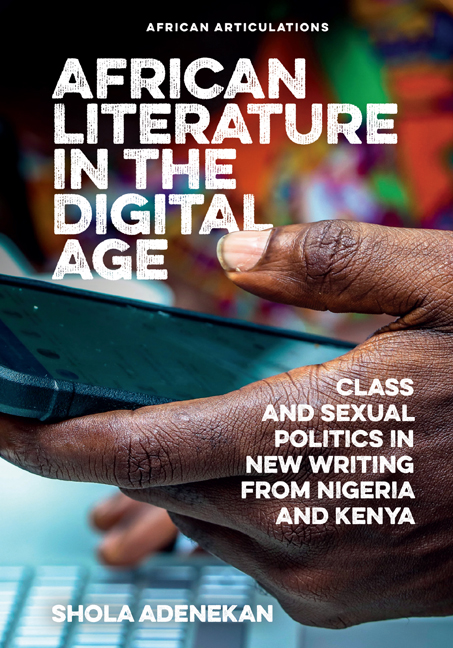 African Literature in the Digital Age
African Literature in the Digital Age Book contents
- Frontmatter
- Dedication
- Contents
- List of Illustrations
- Acknowledgements
- List of Abbreviations
- Introduction: Kenyan and Nigerian Writers in the Digital Age
- 1 Network Thinking: Literary Networks in the Digital Age
- 2 Class and Poetry in the Digital Age
- 3 Class Consciousness in Online Fictions
- 4 Digital Queer: The Queering of African Literature
- 5 Middle-Class, Transnational, Queer, and African
- 6 ‘Ashewo no be job’: The Figure of the Modern Girl in the Digital Age
- 7 The Erotic in New Writing from Nigeria
- 8 Social Media and the Aesthetics of the Quotidian
- Conclusion: Connecting the Dots
- Bibliography
- Index
- Miscellaneous Endmatter
3 - Class Consciousness in Online Fictions
- Frontmatter
- Dedication
- Contents
- List of Illustrations
- Acknowledgements
- List of Abbreviations
- Introduction: Kenyan and Nigerian Writers in the Digital Age
- 1 Network Thinking: Literary Networks in the Digital Age
- 2 Class and Poetry in the Digital Age
- 3 Class Consciousness in Online Fictions
- 4 Digital Queer: The Queering of African Literature
- 5 Middle-Class, Transnational, Queer, and African
- 6 ‘Ashewo no be job’: The Figure of the Modern Girl in the Digital Age
- 7 The Erotic in New Writing from Nigeria
- 8 Social Media and the Aesthetics of the Quotidian
- Conclusion: Connecting the Dots
- Bibliography
- Index
- Miscellaneous Endmatter
Summary
In an interview with the British journalist Stephen Moss, published on The Guardian website, Chimamanda Ngozi Adichie recounts a conversation with an American professor at the university where she was a postgraduate student, who refused to believe in the veracity of her first novel Purple Hibiscus (2003):
I was told by a professor at John Hopkins University that he didn't believe my first book … because it was too familiar to him. In other words, I was writing about middle-class Africans who had cars and who weren't starving to death, and therefore to him it wasn't authentically African … People forget that Africa is a place in which class exists … it's as if Africans are not allowed to have class, that somehow authenticity is synonymous with poverty and demands your pity and your sympathy.
In this interview, Adichie's story about the Johns Hopkins’ professor attests to continuing stereotypes about Africa and Africans, even in elite university circles in the global North. In part, this seems symptomatic of a homogenising tendency, as expressed by that professor, which refuses to recognise class differences in African countries, or that some Africans occupy an environment increasingly recognisable as middle class. But if we are to investigate modern Nigerian and African identities being shaped and transformed by globalising and localising tendencies, the question of social class cannot be ignored.
I want to explore how African authors are representing themselves within cyberspace both as African people and as individuals with a burgeoning self-identification as middle class. As previously alluded to, I use the term ‘middle class’ to designate those who possess the accoutrements of a middle class in terms of education and cultural capital. Illustrating from Nigerian examples, I will discuss how some online writings operate to consolidate the notion of a middle-class identity, how this both performs as something indigenously Nigerian and also reaches towards an international middle-class audience.
The issue of class identity offers the opportunity to robustly unpack the complexity of Nigeria and Kenya in the twenty-first century and it highlights the intersection of literary sociability and class consciousness.
- Type
- Chapter
- Information
- African Literature in the Digital AgeClass and Sexual Politics in New Writing from Nigeria and Kenya, pp. 63 - 74Publisher: Boydell & BrewerPrint publication year: 2021


